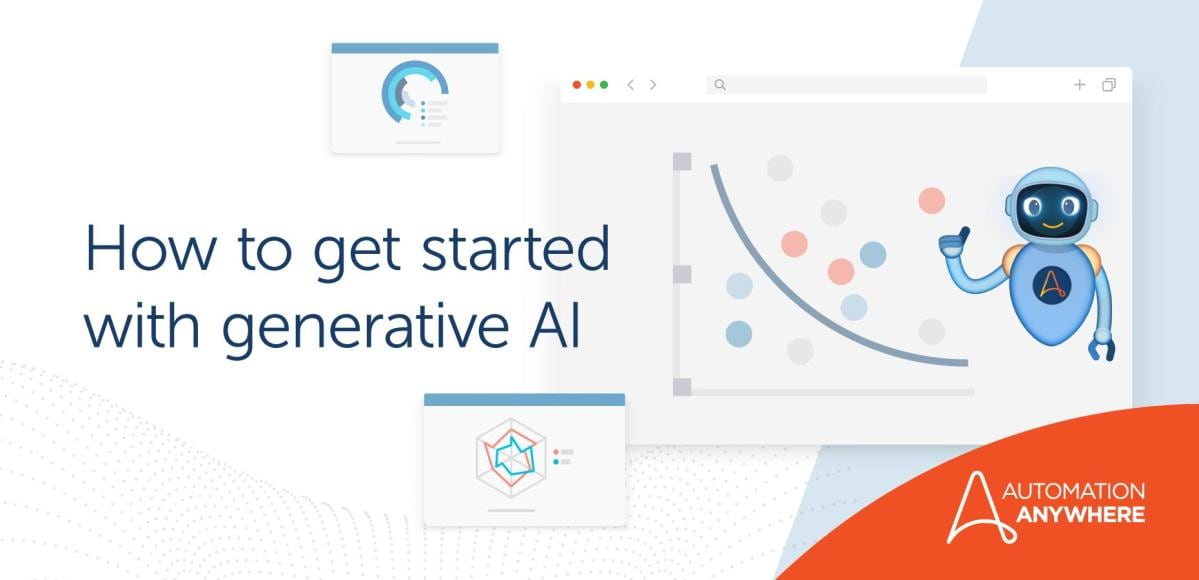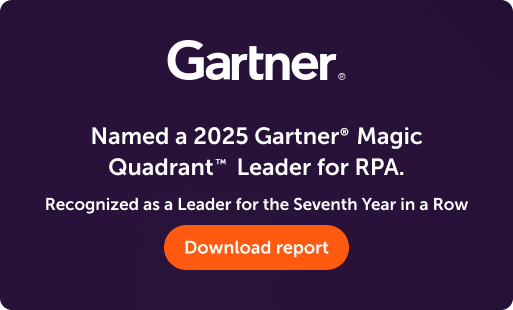- Login
- Search
- Contact Us
-
Have a question? Our team is here to help guide you on your automation journey.
-
Explore support plans designed to match your business requirements.
-
How can we help you?
-
- AI
AI Without the Hype From pilot to full deployment, our experts partner with you to ensure real, repeatable results. Get Started
- Automation Anywhere AI
-
- Solutions
Featured Agentic Solutions
Accounts Payable Invoice automation—No setup. No code. Just results. Accounts Payable
Customer Onboarding Scale KYC/AML workflows. Customer Onboarding
Customer Support Keep queues moving, even at peak load. Customer Support
Healthcare RCM Revenue cycle management that runs itself. Healthcare RCM
- Products
Platform Features
- Agentic process automation (APA)
- Robotic Process Automation (RPA)
- View all Products
-
- Resources
Get Community Edition: Start automating instantly with FREE access to full-featured automation with Cloud Community Edition.
Featured
 Named a 2025 Gartner® Magic Quadrant™ Leader for RPA.Recognized as a Leader for the Seventh Year in a Row Download report Download report
Named a 2025 Gartner® Magic Quadrant™ Leader for RPA.Recognized as a Leader for the Seventh Year in a Row Download report Download report- Become an Expert
- Developer Tools
- Get Support
- View all resources
-
- Partners
Find an Automation Anywhere Partner Explore our global network of trusted partners to support your Automation journey Find a Partner Find a Partner
- Find a Partner
- For Partners
-
Blog
Top generative AI use cases in IT and beyond
Share this:
Navigate to content
November of 2022 marked a special moment in the technology industry. ChatGPT 3 was launched and became a household name within a matter of weeks. Since then, several improvements have been released, and more vendors are about to launch their own form of generative AI products.
At Automation Anywhere, we have always advocated for intelligent automation and expect generative AI to fuel the fire in the automation space. As an automation company's chief information officer (CIO), I'm frequently asked about my opinions on generative AI and how I envision it being used within my organization.
I am most excited about the potential of generative AI because it doesn't expect you to write hundreds of automation rules. Instead, it simply relies on the power of historical data and user intent to generate an outcome. That solves a big hurdle for automation because no one can anticipate all possible rules in a changing world.
Most of the use cases for generative AI you've heard of have likely revolved around expanding or summarizing content. Today, I am sharing a list of use cases that I am exploring with my team. We may only deploy some of these examples, but most present huge returns on investment (ROI) by replacing expensive tools or saving precious bandwidth for my team.
Use cases for generative AI
Contract reviews
Most legal teams end up spending significant bandwidth scanning huge contracts looking for terms or clauses that could be problematic. Many third-party vendors, like Kira Systems or Juro, exist that address this pain point. However, generative AI products like ChatGPT are remarkably effective at using a persona-based approach while analyzing unstructured data. Of course, you'll still need to protect your sensitive data, but there is great potential in reducing the time it takes for contract reviews.
Language translation
Localization and language translation for text, audio, and video is a big industry. Most organizations spend significant funds on manual translations for creating regional content. Generative AI makes it possible to reduce the time and funds typically spent on localization efforts. In our tests, ChatGPT 3.5 did a phenomenal job translating the video scripts that were taking a long time to process, even while using other paid translation services.
Automated IT support
The days of ticket-based IT support are numbered. Like many other organizations, we were in the middle of launching employee-facing chatbots to provide an automated conversational experience for IT support. However, while these chatbots can seamlessly integrate with internal corporate systems and pull from that enterprise context, we found them limited in their ability to understand the intent behind a question.
Now, we plan to provide an integrated experience to employees by combining ChatGPT with our existing chatbot experience while using our own intelligent automation platform for actual actions on systems and data.
Review of security alerts
Given the changing geopolitical situation and hybrid work model, most CIOs and chief information security officers (CISOs) had to increase their spending on security operations in the last few years. These investments led to a flood of security alerts. On average, my team receives 500 security alerts a day. Manual review of these alerts drains our resources, especially when 99% turn out to be false alarms.
We are now planning to leverage the power of generative AI for reviewing and recommending an action for every alert. Security is important, and humans will be in the loop, but only for alerts that deserve human intervention.
Sales outreach
If you are a CIO or a software buyer, you probably get spammed with sales outreach emails every day. The very few that I end up reading are the ones that are personalized based on my network, my interests, or areas that I am passionate about. Yes, the software already exists that can generate personalized emails for you. But generative AI might be able to replace these tools and do a better job while driving significant savings.
Customer response quality
If you are in the business of providing customer support, you are likely always concerned about the quality of response your customers are getting. What if an AI-powered bot could provide you with a score based on the quality of your response before you click 'send'? Analyzing text-based unstructured data is a strength of ChatGPT-like services, and we are planning to integrate it with our CRM platform.
Data cleansing
One of the common complaints from sales teams is about poor data quality in CRM systems. Data errors that are obvious to human eyes aren't always that obvious to systems. Generative AI has proven its ability to absorb and process large sets of unstructured data. I look forward to solving CRM data quality problems using generative AI.
Getting started with generative AI
Looking at the endless list of use cases, it's clear that generative AI is game-changing, and you don't want to be sitting on the sidelines when the entire world is moving in its direction.
Before you get started with generative AI, make sure you're ready to jump in by asking yourself these questions:
Will you share sensitive data while using the service?
ChatGPT has recently updated its data privacy terms and now provides ways to protect your data, but you'll want to know upfront about the steps it expects you to take.
Where do you want to draw the line in terms of end-to-end automation?
If your use cases are mission-critical, it's worthwhile to put a human in the loop for decision-making while letting AI do all the grunt work.
If you generate code using one of these services, will you be able to copyright your work?
Currently, no works generated solely by a machine can be protected by copyright in the US. Make sure to stay up to date with the development of copyright protection as it inevitably evolves alongside the growing popularity of generative AI.
Every technology needs to fit well within your existing ecosystem so you can design all the guardrails you need before deployment. Automation Anywhere's Automation 360™ platform natively integrates with ChatGPT 3.5 and lets you keep a human in the loop when needed.
Capitalize on the power of generative AI
About Sumit Johar
Sumit is the chief information officer at Automation Anywhere.
Subscribe via Email View All Posts LinkedInGet to know the Agentic Process Automation System.

For Students & Developers
Start automating instantly with FREE access to full-featured automation with Cloud Community Edition.



